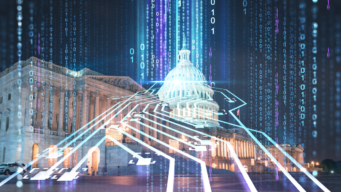The pandemic has precipitated a fundamental shift in the way citizen services are delivered. In the past year, governments have made strides towards improving citizen experience while ensuring security. However, there is still work to be done.
In the year ahead, governments will focus on implementing technology that can help them improve citizen experience, be socially responsible, become more agile, increase cyber resilience, detect and prevent fraud and streamline supply chains using IoT. Here’s an overview of the trends I predict will most impact the public sector in 2023.
Total experience takes center stage
Today, citizens expect government organizations to provide the same seamless experience they get from major retailers. In addition, continued remote workforce expansion is driving the need for improved information access for employees.
In the year ahead, government organizations will continue to invest in citizen experience technology platforms. The most successful organizations will deploy total experience. “Total experience (TX) is an approach that combines the disciplines of UX, CX (inclusive of all government customers, residents, visitors, businesses and others), EX, and MX for a more holistic service design and delivery,” says Gartner®[i]. “It represents a logical evolution in maturity away from CX or EX management in isolation toward creating shared and better experiences for people, regardless of what role they play inside or outside the organization.”
Strong preference for socially responsible vendors
Governments have the opportunity to create long-term value for the citizens they serve. In 2023, governments will look for socially responsible vendors who can help them manage interactions with Indigenous Peoples. One example is recent government-mandated repatriation programs or federal repatriation policies, like those at the Te Papa Museum in New Zealand and the Canadian Museum of History, that are working to locate, identify, negotiate and physically return skeletal remains to Indigenous communities. These efforts present new challenges to governments looking to utilize technology to transfer physical documents or artifacts while preserving a historically relevant “digital twin.”
Governments will need to partner with technology providers that demonstrate strong environmental, social and governance (ESG) commitments to help them manage their repatriation initiatives in a socially responsible way. At OpenText, we take pride in how our products and services can be used for the greater good—while working toward our own zero-footprint pledge to reduce waste and emissions—and are committed to helping our customers reach their ESG goals and become climate innovators.
Accelerating the migration of data to the cloud—securely
Over the past year, we have witnessed cloud become a key enabler for digital transformation in government, with 70% of government organizations indicating they plan to migrate some workloads to the cloud in the next 12 to 18 months, according to the 2021 Center for Digital Government Cloud Migration Survey.
I expect this trend to accelerate in 2023, particularly as security-related programs such as FedRAMP in the U.S. transform the way government data is stored in the cloud. In 2023, we’ll see governments looking to FedRAMP-authorized digital solutions that enable them to securely connect and manage content, automate processes, increase information governance and create engaging digital experiences. At OpenText, we recently achieved the initial “in process” FedRAMP designation for our Cloud for Government solution, demonstrating our commitment to providing FedRAMP-authorized cloud solutions.
New approaches to pursuing zero trust
Following the updates to the National Institute of Standards and Technology’s (NIST) Special Publication 800-207 in February 2020, the strategy of zero trust has become increasingly popular in government. This trend has only accelerated during the pandemic, as governments were faced with an increase in fraud and sophisticated cyber attacks like SolarWinds.
Moving into 2023, the rise in cyber attacks on government will force agencies to continue to evolve their approach to security. More public sector organizations will adopt the zero-trust model, while many others will outsource key elements of their security with a Managed Extended Detection and Response (MxDR) approach.
Learning from COVID-19 aid scammers
As lessons learned from the recent collapse of cryptocurrency firms have shown, accountability and the capability to flag risky activity is critical. Throughout the pandemic, we’ve heard countless stories of bad actors taking advantage of government payouts intended to help those in need. A recent report found evidence that some U.S. fintechs fueled COVID-19 aid fraud, particularly at the Small Business Administration that was tasked to administer about $1 trillion in loans and grants – an estimated $4 billion of which was paid out fraudulently via the Paycheck Protection Program alone.
The Washington Post recently reported that $45.6 billion was illegally claimed from the U.S. unemployment insurance program during the pandemic by scammers using Social Security numbers of deceased people. Similar fraud cases happened in the UK and Canada.
Governments admirably rushed to get COVID-19 relief to individuals who needed it, but this also resulted in unprecedented levels of fraud as scammers sought to take advantage of government expediency. In 2023, governments will need to develop lessons learned, modernize legacy applications and deploy technology to flag risky transactions and reduce fraudulent activity.
IoT deployments find new uses
When you think of IoT applications for defense and intelligence agencies, you probably think of drones being used for military operations. Certainly, the use of drones has increased in recent years, with the Canadian government launching their long-awaited competition for purchase of armed military drones earlier this year.
As we head into 2023, however, new IoT applications will come to the forefront for government. For example, sensors can detect when the weight on a pallet slips below a designated level, triggering an inventory re-order. Defense and intelligence agencies will need to accelerate and expand their IoT deployments to more efficiently operate ethical supply chains, warehousing and environmentally friendly fuel and equipment management.

Learn how OpenText solutions for the public sector industry can help you overcome your organization’s challenges.
[i] Gartner: Top Trends in Government for 2022: Total Experience, January 18, 2022
GARTNER is a registered trademark and service mark of Gartner, Inc. and/or its affiliates in the U.S. and internationally and is used herein with permission. All rights reserved.




